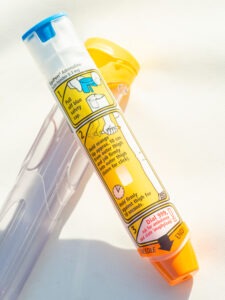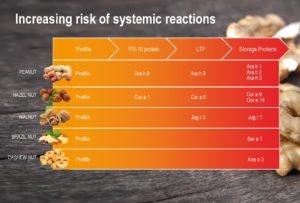Breaking free from the burden of food allergies
Having a child with a food allergy is a heavy responsibility for families. It can be very difficult to avoid the foods your child is allergic to, even if you are very cautious. Food ingredient labels can be confusing, misleading, or just inaccurate. And being overly restrictive can be detrimental to a child’s mental and social well-being.
Our adult and pediatric food allergy specialists can help you and your child live a more normal life. People come to us from NJ, NY, PA, and beyond because our board-certified allergists can change their lives with a new promising food allergy treatment.
Common Food Allergies
Symptoms of a Food Reaction
Allergic reactions to foods can range from mild to anaphylactic. Mild symptoms can be treated with antihistamines, but severe reactions can be life-threatening and require administration of epinephrine. Anaphylaxis symptoms include the following:
- Swelling of the face, tongue or airways.
- Hives and flushing
- Difficulty breathing
- Dizziness
- Stomach cramps
- Nausea or diarrhea
- Severe vomiting
- Fall in blood pressure and shock
Food Allergy Testing
How do I know if I am allergic?
Food allergies affect 32 million people in the United States. Potentially life-threatening food allergies should be evaluated by a board-certified allergist who is able to choose the correct tests and knows how to properly interpret the results.
Together with your symptom history, skin-prick testing or specific IgE blood testing can help determine if you are allergic to a particular allergen. Skin testing for foods is simple and painless and is the most reliable diagnostic tool. It consists of a panel of foods applied via drops with superficial application on the skin. Results can be read within 15 minutes. Blood testing adds important supplemental information.
Blood Tests for Food Allergy
Blood tests for allergies measure the levels of immunoglobulin E (IgE) antibodies in the blood. IgE antibodies are produced by the immune system in response to an allergen, and high levels of IgE antibodies indicate an allergy. The results are scored on a scale from 0-100 ku/L or class 0 to VI. A special blood test called a component panel can can provide additional information by identifying which proteins in a food an individual is most allergic to.
A typical peanut component panel will test for antibodies to components Ara h1, Ara h2, Ara h3, Ara h6, and Ara h8. A child who is only allergic to component Ara h8 of peanut is highly unlikely to have an anaphylactic reaction whereas component Ara h2 is high risk for anaphyaxis. In addition. egg component testing may help predict whether your child will tolerate baked egg goods.
A Comprehensive and Personalized Food Allergy Treatment Plan
Once we’ve accurately diagnosed your condition, our adult and pediatric food allergists will work with you to create a personalized treatment plan. Depending on the severity of the condition, we may recommend food avoidance or a more proactive treatment like oral immunotherapy (OIT).
But your allergy care won’t stop there. We’ll provide ongoing education and teach you the skills you need to manage an allergic reaction, should one occur. We’ll also periodically re-evaluate and deliver necessary medical support along the way.
Food Avoidance vs. Oral Immunotherapy (OIT)
Children typically outgrow food allergies such as milk and egg allergies. Severe peanut and tree nut allergies, on the other hand, can worsen over time and become lifelong conditions. Only 20 percent of children with peanut allergy will outgrow their allergy.
In the past, strict avoidance of the food was the only option—but things have changed. At Allergy Group NJ, we can treat anaphylactic food allergies with oral immunotherapy (OIT), a process where you’re given the allergenic food in very small incremental amounts over time to decrease the reaction. Recent studies have shown that OIT is especially effective in young children and can induce remission in some.
An additional type of treatment was approved by the FDA in February 2024. Xolair, which is a biologic agent is injected every two to four weeks and can decrease the sensitivity of an individual to peanut and other foods. This may an option for some patients instead of OIT, or in conjunction with OIT.
Schedule a Consultation, Testing, or Food Allergy Treatment Today
Our doctors are board-certified allergists providing expert care to children and adults with food allergies. Discover why patients of all ages come to us for life-changing treatments and new possibilities.



